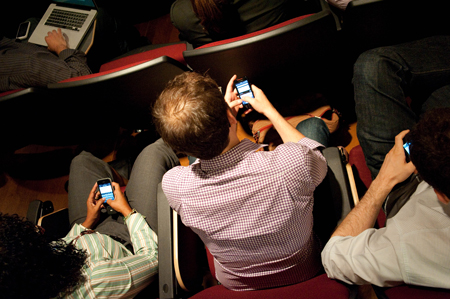Issue 91
Term 4 2014
A world of online distraction
Manager Natasha Georgiou looks at student attentions spans, and the growing evidence that the way we use technology is affecting the way we think and act.
Students are becoming increasingly distracted and are finding it harder to focus on a task for any length of time. A growing amount of research has indicated that how we use technology and what we pay attention to is affecting the way we think, act, and feel. Could it be possible that technology is making it more difficult for the next generation to learn? We as educators need to guide students to become balanced citizens in a digital world. Are we becoming a society of mobile phone addicts?
I know that I often find it difficult to stop picking up my phone throughout the day. Looking at statistics about Australian smartphone usage, we, as adults, are obviously having difficulty putting our phones down, so how are teenagers responding to this mobile media?
Australian teenagers are active players in our digital economy and they are increasingly accessing the internet via mobile technologies. As the price of phones and data declines, there are more and more school age teenagers that have access to smartphones (emarketer.com, 2014). This usage continues to rise as these school age teenagers move into their late teens and twenties.
Is the internet making us stupid?
There is growing debate around this topic with many prominent technology industry leaders aware of smartphone addiction and the issues that can arise from it. They claim that in today's world, convenience, efficiency, and immediacy have become more important than anything else. The engineers of technology companies are creating in humanity the expectation of maximum results for minimum effort. According to Carr (2014), 'media are not just passive channels of information. They supply the stuff of thought, but they also shape the process of thought'.
Carr references a recent study of online research habits, conducted by scholars from University College London, which suggests that we are changing the way we read and think. The researchers found that the people studied exhibited 'skimming behaviour', hopping from one source to another and rarely returning to any source they'd already visited. They typically read no more than one or two pages of an article or book before moving to another source (Carr, 2014). Companies like Google base their business model on this fact. The more we click on links whilst surfing the web, the more they learn about our likes and interests. The information they collect is on-sold to their advertisers, who then market their products to targeted audiences. It is in their economic interests to drive us to continue this trend. The more we click the more they earn.
Distraction is the new focus

Crisis of attention
This 'butterfly effect' of quickly transitioning from one online action to another–which we are able to do anywhere with our smartphones–is starting to have an impact on the cognitive functioning, memory formation, focus, and attention parts of our brains. Joe Kraus has coined this effect a 'crisis of attention'. We have a constant need to fill up the gaps in our day with technology and online media. How often have you seen couples, friends or families at dinner with their mobile phones out instead of talking to each other?
Attention is a muscle, and the less we exercise it, the more weakened it becomes. Kraus (2014) states that to be distracted is a worsening condition; this is because we are training our brain in only one area–the fast thinking part–and overlooking the long form thinking, contemplative, solitude-seeking, and creative areas. We are not giving ourselves time to work on these important sides of our thinking. In fact, we now often feel anxious when our brains are 'unstimulated'.
Connected, but alone?
Being always connected has had an impact in the way we interact with others. Dr. Sherry Turkle pointedly noted in her TED Talk that 'we are lonely but fearful of intimacy. Digital connections offer the illusion of companionship without the demands of friendship. We expect more from technology and less from each other.' (Turkle, 2012). This explains the constant desire for virtual contact and how that contact gets in the way of real relationships.
Turkle believes that we are using modern technology to present ourselves as we want to be. We can easily edit, delete, and retouch ourselves and, in effect, hide from each other. This is a bigger problem for adolescents as they need to learn to develop face-to-face relationships. In the midst of this constant connection is isolation. She warns that 'if we don't teach our children to be alone, they will only know how to be lonely.' (Turkle, 2012). What is missing from our modern society is the need for self-reflection. It is important that we find the time and space to reflect and process our thoughts and actions. As educators we should address this issue by instilling mindful practices in our classrooms.
Should we ban technology in education?
It is unwise to say that mobile technology is bad and that it should be banned from schools. Such a decision would make education increasingly irrelevant and outdated to students, and yet in many schools this is the case. Modern technology, including smartphones and tablets, enhances our lives. In Plato's Phaedrus, Socrates is quoted on his concern about the invention of books, as he thought that writing would 'destroy education by discouraging students from using their own memories.' There was also fear when textbooks began to be published in the 1800s. Many believed that teachers would no longer be needed, that the texts would contain all of the information that students needed to learn (Laster, 2013).
Finding a Balance
As educators it is important that we understand technology and its advancements, and keep abreast of how it impacts student learning. Furthermore, as Teacher Librarians we are well placed in our schools to inform others of how students seek information in this connected and increasingly personalised world. Mobile devices have changed the school library landscape and we need to be prepared for this if we want to remain relevant in our schools. In a world of information overload, libraries have never been more important. Teaching information and digital literacies, and promoting and encouraging a love of reading are vital for the success of our students.
In seeking balance it is important to model appropriate use of technology. Reading promotion programs are still relevant. We need to teach traditional literacy before we can tackle its digital equivalent. Encourage other teachers, from the Principal down, to spend time reading each day. I previously worked in a school where once a week every student and teacher spent 40 minutes in a calm space away from technology. Reading was encouraged, but listening to music or playing computer games was not allowed. It was interesting watching 14 and 15 year olds struggle with this time, but I can now appreciate how important it is for students and teachers to take time out of their schedules.

We stand so close together, but we are so far apart
We also need to encourage deeper learning experiences. Always focus on your learning objectives and use digital tools only to compliment or enhance these skills. Whatever you teach you also need to keep in mind the purpose behind using the technology; if it has a purpose then it needs to be taught and assessed, otherwise students may never make the transition from using the technology as a form of entertainment to a productive tool.
Teaching self-reflection
Self-reflection goes hand-in-hand with mindfulness; the intentional cultivation of moment-by-moment, non-judgmental, focused attention and awareness. It is not about eliminating technology, but about the importance of scheduling into our busy routines some 'time out'. Research has shown that teaching mindfulness and self-reflection develops various skillsets, including increased attention, social skills, and self-esteem (mindfuleducation.org, 2014). Technology will continue to change our society and we will likely continue to be distracted by it. In our effort to adapt we need to stop and reflect on how we can use it productively and responsibly. It is time now to learn how to become mindful educators and create learning environments that promote and practice mindfulness, respect, and appropriate use of technology, as well as self-reflection. Are you ready to accept this challenge?
References
- Carr, N. (2014). 'Is Google Making Us Stupid?' [online] The Atlantic. Available at: http://www.theatlantic.com/magazine/archive/2008/07/is-google-making-us-stupid/306868/
- emarketer.com, (2014). 'Smartphone Users Worldwide Will Total 1.75 Billion in 2014'. [online] Available at: http://www.emarketer.com/Article/Smartphone-Users-Worldwide-Will-Total-175-Billion-2014/1010536
- Kraus, J. (2012). 'Slow Tech'. [online]. Available at: http://www.youtube.com/watch?v=EzpX0TLKS9Q
- Laster, S. (2013). 'The uncomfortable truth about personalized learning'. [online]. Available at: http://gigaom.com/2013/09/02/the-uncomfortable-truth-about-personalized-learning/
- mindfuleducation.org, (2014). Association for Mindfulness in Education —. [online]. Available at: http://www.mindfuleducation.org/
- Turkle, S. (2012). 'Connected, but alone?'. [online]. Available at: http://www.ted.com/talks/sherry_turkle_alone_together
Image credits
- Crisis of Attention: Photography by Erin M. Available at: http://flic.kr/p/8bgTAw. CC BY-NC.
- We stand so close together, but we are so far apart: Photography by Ed Yourdon. Available at: http://flic.kr/p/6HKCex. CC-BY-NC-SA.
